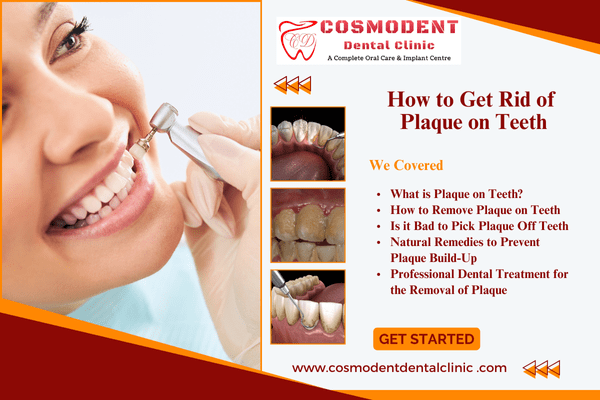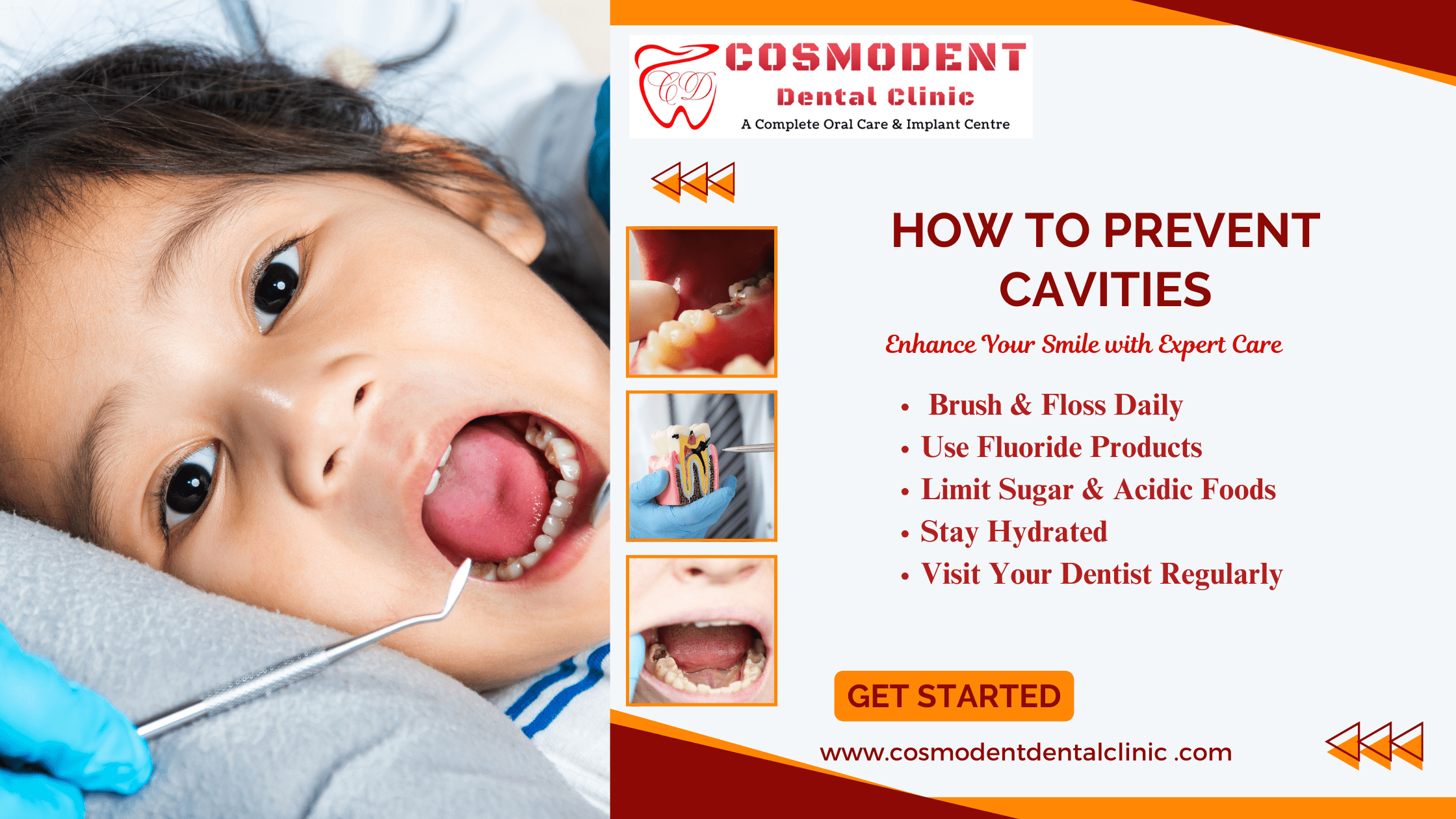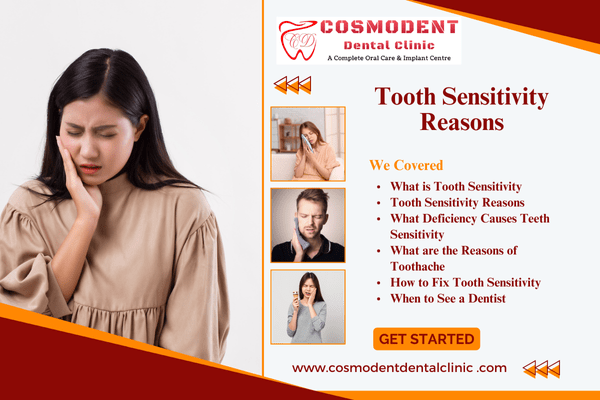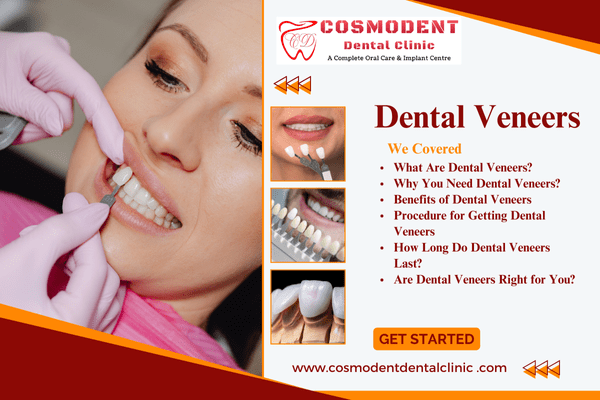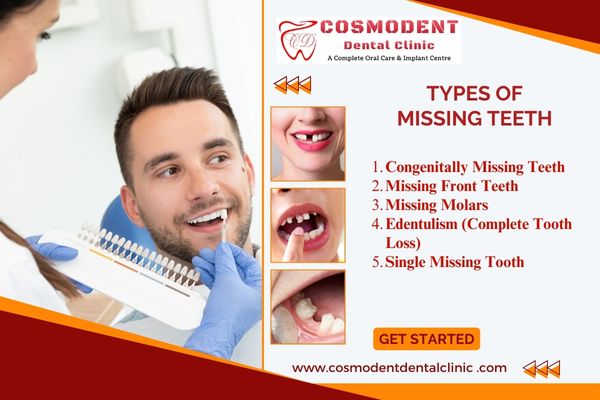Tooth sensitivity is a common dental problem that affects millions of people worldwide. If you experience a sharp pain in your teeth when consuming hot, cold, sweet, or acidic foods, you may be dealing with sensitive teeth. Understanding the reasons behind tooth sensitivity can help you take the right steps to prevent and treat this discomfort. In this blog, we will explore the tooth sensitivity reasons and how to fix it.
What is Tooth Sensitivity?
Tooth sensitivity, also known as dentin hypersensitivity, occurs when the protective layers of your teeth, such as enamel or cementum, wear down, exposing the dentin underneath. The dentin contains tiny tubules that lead to the nerve endings inside the tooth. When exposed to external stimuli like temperature changes or certain foods, these nerve endings react, causing discomfort or pain.
Tooth Sensitivity Reasons: The Main Causes
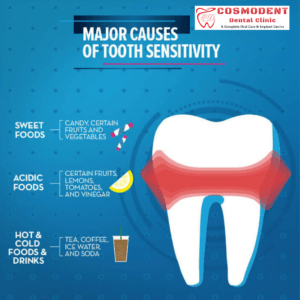
Enamel is the hard outer layer of your teeth that protects them from decay and sensitivity. Over time, consuming acidic foods and drinks such as citrus fruits, soda, and vinegar can erode the enamel, making teeth more sensitive.
- The gum low recession
Receding gums expose the tooth roots, which lacks enamel protection. It makes them more prone to sensitivity when exposed to cold, heat or sugars. Rubber recession is often caused by aggressive brush, gum disease or aging.
- Tooth Decay and Cavities
Cavities and tooth decay weaken the structure of the tooth, exposing the inner dentin. This can lead to sensitivity, especially when consuming sweets or hot and cold beverages.
- Cracked or Chipped Teeth
A cracked or glued tooth can highlight the inner layers including dentine and veins. This exposure can cause pain and sensitivity, especially when cutting hot or cold foods.
- Teeth Grinding (Bruxism)
Grinding or firm teeth, especially at night, carrying the enamel down, exposes the dentine and increases sensitivity. Over time it can also crack teeth.
- Excessive use of white products
Many without disk-white products contain rigid chemicals that can weaken the enamel and cause sensitivity. If you often use whiter toothpaste or treatment of treatment, you can increase tooth sensitivity.
- Plaque Buildup
Plaque accumulation on the teeth and gums can lead to gum disease and enamel erosion, contributing to sensitivity. Regular brushing and flossing help prevent excessive plaque formation.
- Dental Process
Recent dental work, such as filling, crown or deep cleaning, can cause temporary sensitivity. It usually decreases within a few days or weeks, but if it persists, see for your dentist.
What Deficiency Causes Teeth Sensitivity?
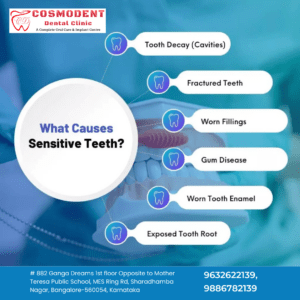
Some nutritional deficiencies are main source of tooth sensitivity reasons. Some of the most commonplace deficiencies related to this problem are:
- Calcium Deficiency
Calcium is important for strong enamel. Low nutrition D can cause an increase in receptive teeth and sensitivity. Fat fish, eggs and dairy products, and almonds are excellent sources of calcium.
- Vitamin D deficiency
Vitamin D helps the frame soak up calcium. Reduced vitamin D can result in an increase in susceptible tooth and sensitivity. Fat fish, eggs and speedy merchandise such as sun exposure and meals assist to sell Vitamin D stages.
- Vitamin B12 -deficiency
Vitamin B12 deficiency can motive gum sickness and neurological ache, that could make contributions to teeth sensitivity. This deficiency is commonplace in vegetarians and vegetarians, so dietary supplements can be important.
- Lack of Magnesium
Magnesium performs a role in bones and teeth fitness. A deficiency can weaken the shape of the teeth, that could cause sensitivity. Nuts, seeds and full grain are suitable resources of magnesium.
What are the Reasons of Toothache?
Toothache may be obtained from unique dental problems. Here are some of the most common reasons:
- Cavities: Teeth reason cavities that highlight the inner layers of the tooth and cause pain and sensitivity.
- Gum ailment: Ging’s inflammation can result in a boom in ache, swelling and sensitivity because of plaque building.
- Tann abscess: A bacterial dental contamination can cause a painful abscess, which calls for instantaneous tooth exam.
- Sinus infection: In a few cases, a sinusitis can motive toothache, particularly in the upper molar.
- Impacted Wisdom Teeth: Wisdom teeth that do not have enough space to appear properly can cause pain and pressure.
How to Fix Tooth Sensitivity
If you suffer from tooth sensitivity, there are several effective ways to reduce discomfort and protect your teeth:
- Use a Desensitizing Toothpaste: Special toothpaste for sensitive teeth contains ingredients like potassium nitrate or stannous fluoride, which help block nerve signals and reduce pain.
- Maintain Good Oral Hygiene: Brush your teeth twice a day with a soft-bristled toothbrush and fluoride toothpaste. Floss daily to remove plaque and prevent gum disease.
- Avoid sour and sugary food: Limiting your intake of acidic foods and beverages can help prevent enamel erosion and reduce sensitivity.
- Use a mouth guard to grind teeth: If you grind your teeth at night, a customized fit protection can protect your enamel and reduce sensitivity.
- Get fluorine treatment: Your dentist can use fluorine lacquer or gels to strengthen the enamel and reduce sensitivity.
- Treat the gum low recession: If gums cause sensitivity, treatment such as rubber poding or scaling and root planning can help.
- Consider Dental Bonding or Sealants: For severe cases, your dentist may recommend bonding exposed tooth roots or applying sealants to protect against sensitivity.
When to See a Dentist
If your tooth sensitivity persists despite home remedies, or if you experience severe pain, swelling, or bleeding gums, it’s essential to consult a dentist. They can diagnose the underlying cause and recommend the best treatment options for long-term relief.
Conclusion:
Tooth sensitivity is a common yet manageable dental issue. Understanding the tooth sensitivity reasons and addressing them with proper oral care and lifestyle changes can significantly reduce discomfort. From maintaining a healthy diet to using desensitizing toothpaste and visiting your dentist regularly, there are many ways to keep your teeth strong and pain-free.
At Cosmodent Dental Clinic in MES Ring Road, Bangalore, our experienced dental team, led by Dr. B Somashekar, is dedicated to providing personalized care for sensitive teeth and other dental concerns. Contact us today to schedule an appointment and regain your confidence in your smile!

